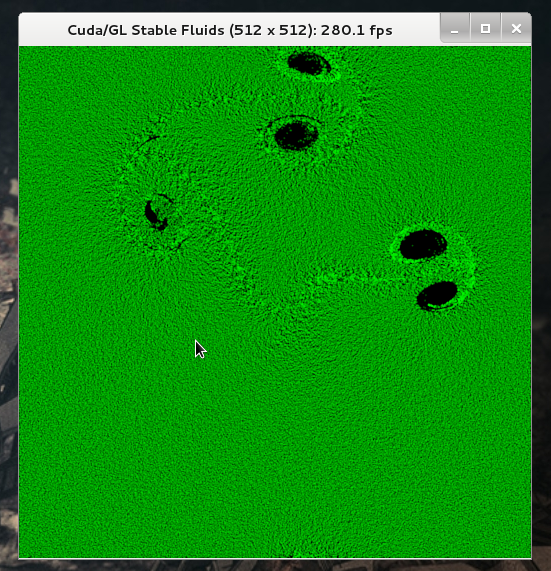(Added link to the CUDA downloads page) |
m (Just being a grammar nazi) |
||
| Line 20: | Line 20: | ||
Let's download and save them on the Desktop. | Let's download and save them on the Desktop. | ||
32 bit : | |||
<pre> | <pre> | ||
cd ~/Desktop | cd ~/Desktop | ||
| Line 26: | Line 26: | ||
wget http://developer.download.nvidia.com/compute/cuda/4_2/rel/sdk/gpucomputingsdk_4.2.9_linux.run | wget http://developer.download.nvidia.com/compute/cuda/4_2/rel/sdk/gpucomputingsdk_4.2.9_linux.run | ||
</pre> | </pre> | ||
64 bit : | |||
<pre> | <pre> | ||
cd ~/Desktop | cd ~/Desktop | ||
Revision as of 11:39, 7 September 2012
This document provides instructions to install/remove Cuda 4.2 on Fedora. The final goal will be to be able to run GPUGRID applications.
Installation
Prerequisites
First, be sure your GPU is compatible with Cuda. Refer to this page. Then, install required packages:
su -c 'yum install wget make gcc-c++ freeglut-devel libXi-devel libXmu-devel mesa-libGLU-devel'
Downloads
You will have to download two programs: "CUDA Toolkit" and "GPU Computing SDK". Refer to the NVidia CUDA downloads page for latest versions.
Let's download and save them on the Desktop.
32 bit :
cd ~/Desktop wget http://developer.download.nvidia.com/compute/cuda/4_2/rel/toolkit/cudatoolkit_4.2.9_linux_32_fedora14.run wget http://developer.download.nvidia.com/compute/cuda/4_2/rel/sdk/gpucomputingsdk_4.2.9_linux.run
64 bit :
cd ~/Desktop wget http://developer.download.nvidia.com/compute/cuda/4_2/rel/toolkit/cudatoolkit_4.2.9_linux_64_fedora14.run wget http://developer.download.nvidia.com/compute/cuda/4_2/rel/sdk/gpucomputingsdk_4.2.9_linux.run
Installation of CUDA Toolkit
Go to "Desktop", add execution permissions of the cudatoolkit downloaded file, and execute it with root permissions:
cd ~/Desktop chmod +x cudatoolkit_4.2.9_linux_* su -c './cudatoolkit_4.2.9_linux_*'
When it will ask you:
Enter install path (default /usr/local/cuda, '/cuda' will be appended):
type /opt.
Installation of GPU Computing SDK
As before, go to "Desktop", add execution permissions of the gpucomputingsdk downloaded file, and execute it without root permissions:
cd ~/Desktop chmod +x gpucomputingsdk_4.2.9_linux.run ./gpucomputingsdk_4.2.9_linux.run
When it will ask you:
Enter install path (default ~/NVIDIA_GPU_Computing_SDK):
press [enter] (to use default path), and type /opt when it will ask you:
Enter CUDA install path (default /usr/local/cuda):
Preparation
Update variables, and this on every boot:
export PATH=$PATH:/opt/cuda/bin export LD_LIBRARY_PATH=$LD_LIBRARY_PATH:/opt/cuda/lib:/opt/cuda/lib64 echo 'export PATH=$PATH:/opt/cuda/bin' >> ~/.bash_profile echo 'export LD_LIBRARY_PATH=$LD_LIBRARY_PATH:/opt/cuda/lib:/opt/cuda/lib64' >> ~/.bash_profile
Compilation
Fedora 16
We finally compile:
32bits:
cd ~/NVIDIA_GPU_Computing_SDK/C LINKFLAGS=-L/usr/lib/nvidia/ make
64bits:
cd ~/NVIDIA_GPU_Computing_SDK/C LINKFLAGS=-L/usr/lib64/nvidia/ make
Fedora 17
Some compatibility problems appeared with gcc-4.7. You will have to install a compatibility version:
su -c 'yum install compat-gcc-34 compat-gcc-34-c++'
Create a symbolic link to make Cuda point to gcc-3.4:
su -c 'ln -s /usr/bin/gcc34 /opt/cuda/bin/gcc'
Now, you can compile.
32bits:
cd ~/NVIDIA_GPU_Computing_SDK/C LINKFLAGS=-L/usr/lib/nvidia/ make cuda-install=/opt/cuda
64bits:
cd ~/NVIDIA_GPU_Computing_SDK/C LINKFLAGS=-L/usr/lib64/nvidia/ make cuda-install=/opt/cuda
Test
Now, let's test if Cuda is working great. Type:
~/NVIDIA_GPU_Computing_SDK/C/bin/linux/release/./fluidsGL
As you can see on the following picture, it works !
Now we can use GPUGRID applications with Boinc.
Cleanup
Now Cuda is installed, the installers files are useless, you can remove them:
cd ~/Desktop rm cudatoolkit_4.2.9_linux_* rm gpucomputingsdk_4.2.9_linux.run
Uninstallation
If you want to totally remove Cuda, juste delete the /opt/cuda and ~/NVIDIA_GPU_Computing_SDK folders:
rm -r ~/NVIDIA_GPU_Computing_SDK su -c 'rm -r /opt/cuda'
and remove the export PATH=$PATH:/opt/cuda/bin and export LD_LIBRARY_PATH=$LD_LIBRARY_PATH:/opt/cuda/lib:/opt/cuda/lib64 lines of the ~/.bash_profile file.

